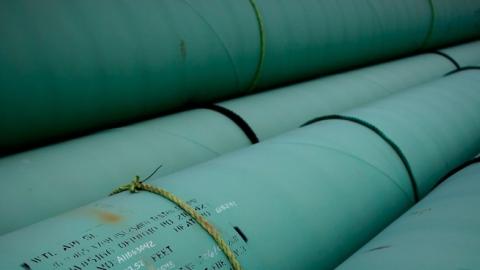The ongoing drama over completing the Keystone XL Pipeline, the proposed 1,179-mile conduit for Canadian crude oil running from Hardisty in Alberta to Steele City, Nebraska, has reached its climax in the Senate. With the House already approving the pipeline, the question now is whether pro-Keystone senators can muster the votes needed to override an Obama veto--which is also all but guaranteed.
According to bill co-sponsor Senator John Hoeven of North Dakota, supporters are four votes short of the required 67. Democratic opponents of the pipeline are doing the bidding of environmentalists who have bitterly fought it for the past five years. Their argument that it will blight the environment largely collapsed after the State Department, which studied the crossborder project, concluded it would cause no significant environmental damage. Meanwhile, there is bipartisan support for the project. Multiple estimates of the tens of thousands of direct and indirect jobs the construction project would create have prompted unions such as the Laborers’ Union of North America to back Keystone.
Yet the clincher argument for Keystone may not hinge on jobs or the environment, but on national security--more precisely, North American energy security. From that perspective, Keystone is even more vital today than it was when first proposed, thanks to falling oil prices.
Those who argue that Keystone is no longer needed because of $50 crude oil have it exactly wrong. Falling prices make it even more important for producers to lower their transportation costs. Keystone could shave as much as five dollars from the cost to deliver every barrel of Canadian crude sold to American refiners. That difference matters more at $50 or $60 a barrel than it does at $100 or $80 a barrel, where oil was just a few short months ago.
Lower transportation costs matter both to American consumers and Canadian oil producers. While most analysts agree U.S. shale producers will weather the current global fall in prices, it has put oil far below Canada’s average break-even price for tar sands production, which stands at about $60. That’s tar sands crude that our domestic refiners are ready and eager to get, of which which Keystone is geared to deliver some 830,000 barrels a day.
Keystone would throw a lifeline to Canada’s oil industry when they most critically need it--just as we still need Canada. Despite the growing production of oil from United States shale, Canada is still our number one energy import partner. Expanded production there in the last decade has eased our reliance on oil from OPEC, and it has complemented our own shale production in lowering world aggregate demand and raising global supply.
That’s one reason the Saudis and OPEC are deliberately driving oil prices down by keeping their own production at current levels. They don’t just want to drive U.S. shale producers out of business--they particularly want to hurt our Canadian neighbors, who produce the same kind of “sour” crude as the Saudis--and who represent a more direct threat to their markets in Asia, especially China.
Nothing would please Riyadh and Tehran more than seeing Canada’s oil business shutting down and running dry--probably even more than seeing American producers go bankrupt.
By contrast, Keystone will go a long way to help Canada’s energy sector through troubled times, as well as helping to mend relations with Ottawa, which has been waiting for years for the United States to approve this crucial link in the TransCanada pipeline system.
Opening Keystone will also inaugurate a new era of further integration of our joint US-Canada energy infrastructure--to everyone’s benefit--and send a clear message to OPEC that their strategy of bankrupting their North American competition isn’t going to work.
This isn’t charity, this is good business--even good environmentalist sense. By reducing Canada’s producers' transportation costs by some five dollars a barrel, it will keep them from launching other new projects to get their oil to market, ones with a much bigger environmental impact. In addition, a completed XL pipeline will be far safer for moving Canadian crude than relying on a rail transport system that’s prone to spills and accidents--even fatal ones like the one that happened in Quebec in 2013 that killed 47 people.
A completed Keystone pipeline won’t make the Saudis happy. But it will help our northern neighbor at the same time we help ourselves, and help to build the energy infrastructure that will benefit all of us now, and far into the future.

















